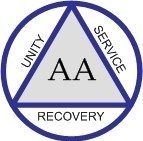A.A. PREAMBLE
Alcoholics Anonymous is a fellowship of people who share their experience, strength and hope with each other that they may solve their common problem and help others to recover from alcoholism.
The only requirement for membership is a desire to stop drinking. There are no dues or fees for A.A. membership; we are self-supporting through our own contributions. A.A. is not allied with any sect, denomination, politics, organization or institution; does not wish to engage in any controversy; neither endorses nor opposes any causes. Our primary purpose is to stay sober and help other alcoholics to achieve sobriety.
A.A. Preamble Copyright (c) by The A.A. Grapevine, Inc. Reprinted with permission.
What is AA?
Alcoholics Anonymous is a worldwide fellowship of men and women who help each other to stay sober. They offer the same help to anyone who has a drinking problem and wants to do something about it. Since they are all alcoholics themselves, they have a special understanding of each other. They know what the illness feels like – and they have learned how to recover from it in A.A.
A.A. members say that they are alcoholics – even when they have not had a drink for many years. They do not say that they are ‘cured.’ Once people have lost the ability to control their drinking, they can never again be sure of drinking safely – or, in other words, they can never become ‘former alcoholics’ or “ex-alcoholics.’ But in A.A., they can become sober alcoholics, recovered alcoholics.”
What A.A. Does
Nonalcoholic guests are welcome at “open” A.A. meetings. Attendance at “closed” meetings is limited to those who are alcoholic or think they may have a drinking problem. At meetings A.A. members share their recovery experience with anyone seeking help with a drinking problem, and give person-to person services or “sponsorship” to the alcoholics coming to A.A. The A.A. program, as set forth in the Twelve Steps to recovery, offers the alcoholic an opportunity to develop a satisfying way of life free from alcohol.
What A.A. Does NOT Do
- Make medical or psychiatric diagnoses or prognoses, or offer advice.
- Provide drying out or nursing services, hospitalization, drugs, housing, jobs, money or other welfare services.
- Accept any money for its services or contributions from outside sources.
- Provide letters of reference to parole boards, lawyers, court officials, social agencies, employers, etc.
- Engage in or support education, research, or professional treatment.
Our recovery is based on sharing our experience, strength and hope with each other, that we may solve our common problem; more importantly, our continued sobriety depends upon helping others to recover from alcoholism.
